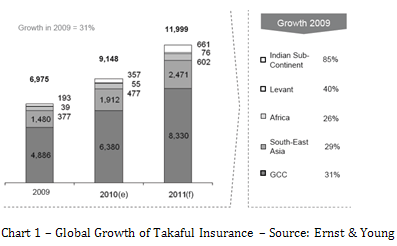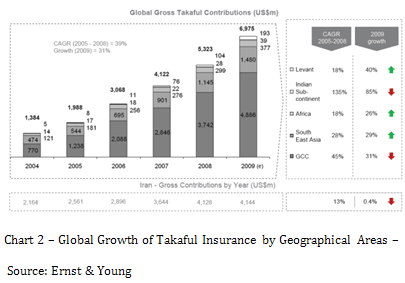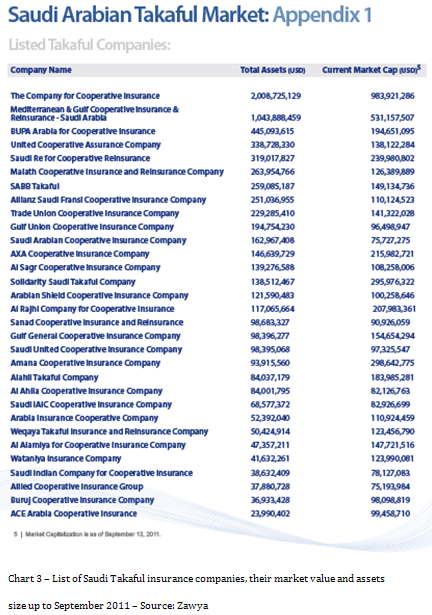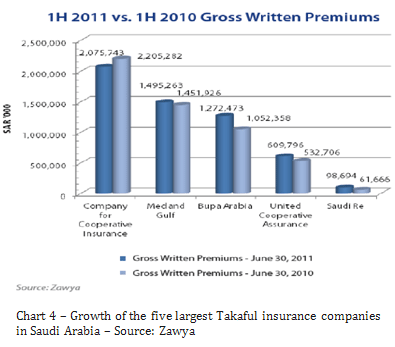The Kingdom of Saudi Arabia is at the top of the world in terms of the growth of Takaful market, where the size of Takaful insurance market is expected to reach USD 7.7 billion by the end of 2012, after reaching nearly USD 5 billion in the first quarter of this year, according to recently published reports. (source)
Globally
A recent report issued by Ernst & Young on the global Takaful insurance, emphasized that the global Takaful industry is growing steadily with expectations of volume reaching USD 12 billion by the end of 2011, up from USD 9.15 billion in 2010. The report also noted that there is a transformation in the operational performance and that the contributions in the Takaful insurance companies increased by 31% to reach USD 6.9 million worldwide in 2009.


Moulay Khalil, Assistant Professor of Economics, pointed out that the Islamic Takaful Insurance has witnessed a recent significant growth over the past few years that let it earn a prominent position in the global insurance market and made it a strong competitor to conventional insurance, which had the lion's share for many years in this sector. According to the available statistics in this regard, we find today a noticeable increase in the Takaful insurance and re-insurance companies, up to more than 54 companies in the Arab region and 103 companies worldwide, which was not the case in the recent past. These statistics highlight clearly the growing demand of Takaful insurance products in the financial market.
He added that there are more than 1.5 billion Muslims around the world and a growing number of around 54 operating Takaful companies and more than 7 companies currently under establishment in the Middle East. All companies operating in accordance with the provisions of the Islamic Sharia'a are bound to apply Takaful insurance system and the number of contributions (premiums) reached around USD 7 billion in 2010.
RegionallyA recent report issued by Standard & Poor's on the Takaful insurance companies in the Middle East, confirmed that the conventional insurance and re-insurance companies in the Arab world began recently to face a sudden and violent competition with the Islamic insurance companies, or the so-called Takaful or cooperative insurance. The rapid growth and the increasing number of new companies were great but they raise a question on the stability of such a model of commercial business. This growth can sometimes be seen as a motivation factor to increase the insurance premiums, as well as the exposure to illiquid investment assets that are Sharia'a compliant and sometimes volatile, particularly the shares and real estate. These inherent risks may remain confined to Takaful insurance especially that the income of shareholders in particular depends on a fixed share of the total underwritten premiums. The report also noted that some risks can be limited through prudent management, good corporate governance, effective control of risks and conservative centralized legislations.
The report added that there are around 180 insurance companies and 11 re-insurance companies operating currently in accordance with the Sharia'a, and most of these companies are concentrated in the Islamic world. All these companies are considered almost new and small in terms of global standards, designed exclusively for business activities in their local markets. Consequently, the strong and growing impact of these companies was not obvious to foreign observers.
However, in the recent years, the value of insurance premiums underwritten by Takaful insurance and re-insurance companies, varied between USD 8 billion and USD 10 billion annually in more than 45 developing markets and this number is still growing steadily. Some estimates suggest that this industry may witness subscriptions by more than USD 12 billion of the total insurance premiums in 2011.
According to the report of Ernst & Young for 2010, the KSA is the first in terms of the size of Takaful market with USD 3.9 billion, followed by Malaysia with USD 1.2 billion, United Arab Emirates USD 640 million, Sudan USD 340 million, Indonesia USD 252 million, Qatar USD 136 million and Kuwait USD 127 million.
The Saudi market was the first global Takaful insurance market in 2009, with underwritings totaling SAR 14.5 billion (USD 3.86 billion), and that only five years after the issuance of the Cooperative Insurance Companies Control Law in 2004 and the regulation of the market to control the activity of the companies. According to the report, the total insurance premiums in KSA amounted to USD 1.7 billion in 2007, which represents around half the Takaful premiums in the world.
The report also noted that the Saudi insurance market witnessed a great development during the last five years after activating the Cooperative Insurance Companies Control Law and licensing more than 30 insurance companies in accordance with the requirements imposed by the regulations of the cooperative insurance law.
A report issued by Zawya on the Takaful insurance companies listed in the Saudi market, pointed out that Saudi Arabia has the largest Arab and international Takaful market, where the first insurance company was listed in the Saudi market in 2005, then the total number of listed companies reached 31 up to June 2011, as shown in Chart 3.

The report specified the top five Saudi Takaful insurance companies, as follows:
Company for Cooperative Insurance, Mediterranean and Gulf Cooperative Insurance and Reinsurance, BUPA Arabia for Cooperative Insurance, Saudi Re for Cooperative Reinsurance and United Cooperative Assurance Company.
The five companies recorded total premiums of around SAR 5.55 billion during the first half of 2011, compared to SAR 5.3 billion for the same period in 2010, with a growth rate of 4.68%, as shown in Chart 4.

Controlled Market
Eng. Ahmed Abdel-Wahab Arfien, Managing Director of Egyptian Takaful Insurance Company, stated that the Saudi Takaful insurance market is very closely controlled and organized. He pointed out that the Saudi market is controlled and regulated by the Government, and the compulsory insurance system available at KSA preserves the life and properties of the Saudi citizens and increases the profits of insurance companies as well, resulting into a boom in the Saudi Takaful insurance market.
He also indicated that the Takaful insurance market is one of the very controlled markets in the Arab region that follow the same standards and are based on the Islamic Sharia'a in all the insurance rules. He confirmed that this market has a bright future worldwide especially that it was proven by experience that it was not unaffected by the global economic crises, as none of the Takaful insurance companies was bankrupt, unlike the other types of insurance companies.
He added that there is a remarkable development in the number of Takaful insurance companies in the Arab region, as well as their market share compared to the insurance market as a whole, as for example in Egypt, the market share of insurance companies in 2007 was around 0.7% and currently it is of 8% after only four years. This indicates the people's willingness to underwrite solely in Takaful insurance.
Arfien stressed the importance of exchanging expertise between the insurance companies in the Arab region, due to their role in the growth of this sector, particularly under the fixed rules of Takaful insurance.
Organization
Nasser Al-Nafisi, Manager of Aljoman Center for Economic Consultancy, believes that the Islamic Takaful market in the Gulf region is considered an Islamic form of ordinary insurance and it is an important insurance tool at the moment. He pointed out that most Takaful insurance companies, for example in Kuwait, lack organization, governance and control, which are three essential conditions for the growth of this sector. For instance, in Kuwait, there are dozens of Takaful insurance companies and most of them need control and organization particularly that less than one quarter only of these companies operates with the required efficiency.
However, he emphasized the long-term growth of this sector in the Gulf region as it has the necessary and basic elements there, especially in a country like Saudi Arabia where it is growing dramatically and obviously.
By: Mohamed Abdulzaher
Source : http://www.zawya.com/story.cfm/sidZAWYA20111120053925 - Nov 20, 2011


No comments:
Post a Comment